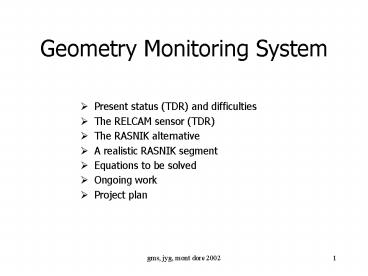Geometry Monitoring System - PowerPoint PPT Presentation
1 / 11
Title:
Geometry Monitoring System
Description:
gms, jyg, mont dore 2002. 2. In TDR, the set-up of laser lines is: ... gms, jyg, mont dore 2002. 6. Initial positions of the Mask and Camera not on the Lens axis ... – PowerPoint PPT presentation
Number of Views:26
Avg rating:3.0/5.0
Title: Geometry Monitoring System
1
Geometry Monitoring System
- Present status (TDR) and difficulties
- The RELCAM sensor (TDR)
- The RASNIK alternative
- A realistic RASNIK segment
- Equations to be solved
- Ongoing work
- Project plan
2
Present difficulties
- In TDR, the set-up of laser lines is
- 4 lines in two vertical planes and one step
- 4 lines in 45o planes in azimuth and two steps
- Problems of this set-up are
- No projectivity
- Two supports to be monitored
- induce lost of precision
- Effect of temperature gradient expected important
in this case of long light lines - question about realistic shielding
3
The RELCAM sensor
- In TDR, was presented the RELCAM sensor
- Semi-reflecting mirror
- CMOS camera (628 x 582 pixels)
- Test on bench
- Laser (785 nm), Granit table (2.5 x 0.5 m2)
- Motorized stage (x, y) 0.5 µm
- Results
- Resolution sx sy 0.5 µm
- Stability ?x, ?y lt 0.8 µm per oC
- Linearity lt 1 µm within 2 x 2 cm2
- Problem a 2 dimension sensor in the transverse
directions (x, y) - z direction not monitored
4
One step laser lines
- We cannot adopt such a set-up
- Due to the constraints imposed by the coil
- More than 24 slats of the stations 3, 4, 5 would
- be on the path of the lines
- No realistic change in their design is possible
- without triggering a crisis with Manoel and
others - Need of new system for monitoring
5
Alternative proposal
- Based on the RASNIK sensor
- Each element is set on a chamber frame/support to
be monitored - Resolution sx sy 1 µm, sz 100 µm
- Well adapted to our problem
- Used by L3, adopted by (GEM) and ATLAS
- Advantages it is a 3 dimension sensor
- and no laser beam is used (safety)
6
A realistic RASNIK segment
- Initial positions of the Mask and Camera not on
the Lens axis - Initial recorded Mask image is not centered on
the Mask - x M,L,C, yM,L,C, zM,L,C shifts can be extracted
from the analysis of the final Mask image
7
The recorded images
y
16 pads
x
M
25 pads
25 pads
8
Equations to be solved
- x0 (y0) initial distance between the camera and
the plane xOz (yOz) containing the optical axis - of the lens
- d (d) initial Mask-Lens distance (Camera-Lens)
along the optical axis - The displacements of the RASNIK elements (Mask,
Lens, Camera) in their coordinate systems are - xM, yM, zM, xL, yL, zL, xC, yC, zC
- Few RASNIK lines are necessary for the monotoring
of three planes - if these planes are rigid planes
x
y
M
(Philippe Pillot)
- x, y shifts of the image
- M magnification
9
Proposal for a new set-up
Reference plane
- We propose to study the performance of a
monitoring system with - 8 RASNIK segments on
- the muon filter (C), the chamber
10 (L), the chamber 9 (M) - Then, 8 RASNIK segments on
- the chamber 10 (C), the chamber 8
(L), the chamber 6 (M), - the chamber 6 (C), the chamber 4
(L), the chamber 2 (M), - the chamber 9 (C), the chamber 7
(L), the chamber 5 (M), - and the chamber 5 (C), the chamber 3
(L), the chamber 1 (M) - And, to increase the constraints between the two
groups of chambers, - 8 RASNIK segments on
- the chambers 2 (C), the chamber 1
(L and M), - and the chamber 4 (C), the chamber 3 (L
and M)
10
Present work
- Evaluation of the performances of the proposed
setup - Resolution in position of each chamber
- Resolution in mass at the ? mass
- Localization of the monitoring lines through the
spectrometer - Position of the elements on the chamber
frames/supports - in collaboration with the Engineers
- Decision (?) for a monitoring of the
chamber/support flatness - Choice of the system, position of the elements
- in collaboration with the Engineers
- Alternative to RASNIK (?)
- System baseline design to be decided by June 2002
(?)
11
Project plan
- Development of the system starting as soon as
possible in 2002 - Measure of the performances
- Study of the temperature gradient effects
(neutralization) - Technical support demanded, answer expected soon
- Realisation of the system starting in 2004
- Design study
- Fabrication of sensors and supports
- Calibrations
- Installation
- Lyon and Erevan
- Budget (MOU)
- 140 KFS to be re-estimated































